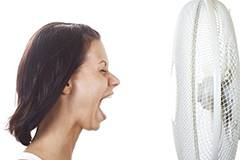Cool News on Menopause-Related Hot Flashes
Medically Reviewed by Gary H. Emerson, MD
Women of menopausal age often view hot flashes (also known as night sweats) as one of the most troublesome symptoms they gain as their menstrual periods stop. Many supposed treatments for hot flashes range from the scientific to old wives’ tales. Research has finally confirmed what experts say works (or doesn’t work) to control these menopause symptoms.
“Hot flashes are triggered by a drop in the female hormone estrogen,” says McLeod Gynecologist Gary Emerson, M.D. “Normally, this heat-releasing mechanism – your heart pumps faster, brain blood flow lessens, blood vessels in your skin enlarge and your sweat glands release perspiration to cool you off – keeps you cool in the summer. But, a drop in estrogen confuses your brain’s response.”
The results of your brain’s reaction: sudden sensations of heat in your face, head and chest. Then, perspiration (sometimes chills) and a red flushing of your skin.
For years, conventional wisdom said that hot flashes lasted 6 to 24 months. Findings from a 2015 study reported findings that hot flashes could last for about 7 years and even up to 11 years.
There are some practical steps that women can take to quiet these hot flashes and night sweats:
- Don’t smoke. Some 62 percent of current smokers suffer hot flashes, compared to 52 percent of ex-smokers and 39 percent of women, who have never smoked. Quitting smoking links to a 14 percent reduction in the severity of hot flashes and a 19 percent decrease in the frequency.
- Drink cold water or juice when you sense a hot flash coming.
- Wear layered clothing that can be removed when a hot flash begins.
- Sleep in a cool room.
- Use bed sheets and blankets that let your skin breathe.
In 2015, the North American Menopause Society assembled an expert panel to review the many reputed treatments for hot flashes, look at the scientific evidence, and rank them into 3 categories. A summary of their findings includes:
SOLID EVIDENCE SUPPORTS –
- Cognitive Behavioral Therapy that combines learning how to feel positive about menopause challenges, combined with deep relaxation techniques and practices that result in a good night’s sleep, otherwise known as sleep hygiene.
- Clinical Hypnosis presents a promising strategy for managing hot flashes, although there is still limited evidence to support this treatment.
- Certain medications including paroxetine salt (a prescription medication approved by the FDA for hot flashes), select antidepressants (serotonin and norepinephrine uptake inhibitors) and gabapentinoids (which are also prescribed for restless leg syndrome). With all these prescription medications, you should start with the lowest dose possible.
RECOMMENDED WITH CAUTION (or what sort of works) includes:
- Weight loss
- Mindfulness-based stress reduction
NOT RECOMMENDED. The panel looked at a number of potential therapies and decided they did not work consistently or sufficiently:
- Exercise
- Yoga
- Acupuncture
- Compounded bioidentical hormones
- Over-the-counter and herbal therapies, such as omega-3s, pollen extract, vitamins, flaxseed, maca, evening primrose, dong quai or black cohosh.
ACTION YOU CAN TAKE
Certainly, if you smoke, you should quit for hot flashes and a long list of health reasons. Losing up to 5 to 10% of your weight can help control hot flashes, prevent type 2 diabetes and breast cancer.
Before you undertake any of the possible treatments for hot flashes, talk with your Gynecologist. He or she will have the latest information and experience, based on their work with other patients.
You may also find these articles useful:
Helping You Handle Those Menopause Hot Flashes
Bleeding After Menopause. Don’t Wait to See Your Doctor
Sources include: McLeod Health, JAMA Internal Medicine, Maturitas, North American Menopause Society, Menopause Journal, Journal of Physiology
-
McLEOD REGIONAL MEDICAL CENTER FLORENCE
843-777-2000 -
McLEOD DARLINGTON
843-777-1100 -
McLEOD DILLON
843-774-4111 -
McLEOD LORIS
843-716-7000 -
McLEOD SEACOAST
843-390-8100 -
McLEOD CHERAW
843-537-7881 -
McLEOD CLARENDON
803-433-3000



-
McLEOD REGIONAL MEDICAL CENTER FLORENCE
843-777-2000 -
McLEOD DARLINGTON
843-777-1100 -
McLEOD DILLON
843-774-4111 -
McLEOD LORIS
843-716-7000 -
McLEOD SEACOAST
843-390-8100 -
McLEOD CHERAW
843-537-7881 -
McLEOD CLARENDON
803-433-3000
 Find a Doctor
Find a Doctor  Locations
Locations  Services
Services 